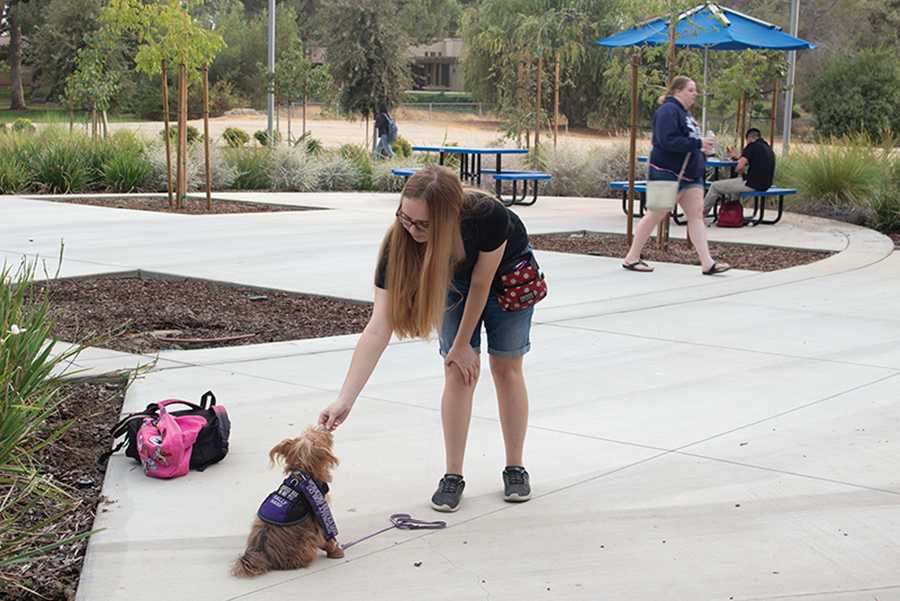Reporter
Soon students, faculty, and staff will be able to bring registered emotional support animals to CSU Bakersfield. In compliance with California’s Fair Employment and Housing Act, the university has created a new service animal policy which includes animals needed for emotional support.
Although the university has had a consistent practice of allowing these animals as a reasonable accommodation for employees and students in university housing, this new policy has been created to establish standard procedures, says Claudia Catota. Catota is chief diversity officer and special assistant to the president. As the Americans with Disabilities Act compliance officer for the university, Catota has worked closely with the Services for Students with Disabilities Office to develop the policy.
Though the Fair Housing Amendments Act has prohibited discrimination in the sale or rental of housing based on need of service animals since the 1980s, Catota says that rights for students and employees with emotional support animals are a relatively new trend.
At an open forum for students, faculty, and staff called University Council last year, attendees discussed a need for a specific policy regarding these therapy animals. It was a combination of law and student concerns that led to the creation of the new policy.
Now that a draft of the policy has been completed, university procedure follows that it must be proposed to the Academic Senate and Associated Students, Inc. On Friday, Sept. 21, ASI had a meeting to read the draft, and are expected to propose changes and give feedback in the near future.
“I would say it will be at least a month” before the policy is ready to go into effect,” Catota says. “Everyone is so busy.”
An emotional support animal is any animal that has been trained to provide assistance or emotional support to a person whose doctor or therapist has recommended it. The medical professional’s recommendation includes a description of how the animal will have a specific impact on the wellbeing of their patient. Though a “service animal” for the university’s purposes describes a dog or a miniature horse, the definition of an “emotional support animal” is not limited to any particular species.
According to Jason Watkins, Assistant Director of Programs and Services for SSD, exotic animals are evaluated on a “case by case basis.” The owner must be in control of the animal and keep it on a leash at all times. It cannot be aggressive, and cannot cause damage to university property. The law dictates that emotional support animals that cause an undue hindrance to the university or housing’s operations can be prohibited.
Exotic emotional support animals have been a problem for other organizations in the past, which is a likely cause for the case by case policy. United Airlines made headlines last January for denying an emotional support peacock from flying, due to size and weight considerations. CSUB’s policy does not have such restrictions.
Though the idea of bringing one’s pet to work or housing on campus may be appealing, Watkins reminds students that this will not be allowed for everyone. Medical professionals do not sign off on the need for emotional support animals arbitrarily, and online registration of animals will not be accepted by the university.
When it comes to purchasing support animal registration online, Watkins cautions students against it. “I really discourage students from wasting their money on that, because legally it means nothing.”
The policy has been in the works for a year now, with input from the CSU system’s legal and general counsel. Watkins is happy with the results of their efforts, and hopes that the policy will greatly benefit students and staff.
“I want students to have every opportunity to succeed here. In terms of employees, we want people to feel welcome and be effective.”
Leanna Harp, a junior majoring in psychology, knows from experience the value that an animal companion can provide. Her Yorkshire terrier mix, Sally, is a psychiatric service dog trained to respond to the increased heart rate that can indicate an oncoming anxiety attack. Sally is not an emotional support animal, because she is trained to complete a specific task, rather than providing emotional support in general.
Harp agrees with Watkins that accommodating students and employees who need emotional support animals is a positive step. However, she worries that restricting these animals to university housing for students might be a dangerous part of the policy.
“The animal might knock something over in the dorm and hurt itself, or it might bark continually and disrupt other students living in the dorm,” Harp explains.








